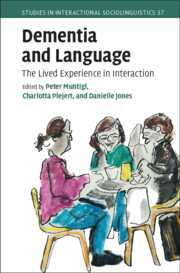Book contents
- Dementia and Language
- Studies in Interactional Sociolinguistics
- Dementia and Language
- Copyright page
- Contents
- Figures
- Tables
- Contributors
- Transcript notation key
- Part 1 Introduction
- Part 2 Dementia and Diagnostics
- Part 3 Dementia and Conversational Strategies
- Part 4 Dementia and Epistemics
- 9 Identifying Family Members in Photographs
- 10 ‘You Know This Better’
- 11 Maintaining Personhood and Authority in Everyday Talk of a Family Living with Dementia
- Part 5 Communicative Challenges in Everyday Social Life
- Index
- References
9 - Identifying Family Members in Photographs
Practical Epistemic and Deontic Challenges for a Person with Frontotemporal Dementia
from Part 4 - Dementia and Epistemics
Published online by Cambridge University Press: 21 November 2024
- Dementia and Language
- Studies in Interactional Sociolinguistics
- Dementia and Language
- Copyright page
- Contents
- Figures
- Tables
- Contributors
- Transcript notation key
- Part 1 Introduction
- Part 2 Dementia and Diagnostics
- Part 3 Dementia and Conversational Strategies
- Part 4 Dementia and Epistemics
- 9 Identifying Family Members in Photographs
- 10 ‘You Know This Better’
- 11 Maintaining Personhood and Authority in Everyday Talk of a Family Living with Dementia
- Part 5 Communicative Challenges in Everyday Social Life
- Index
- References
Summary
For this chapter, we examine everyday interactions involving a person diagnosed with behavioral variant frontotemporal dementia (bvFTD; pseudonym Trudy). Drawing on the methods of conversation analysis, our specific research focus is placed on how knowledge is solicited, displayed and resisted in contexts of viewing family photos. Our data are taken from video recordings of Trudy at home in the presence of family, caregivers and two researchers. We found that looking at family photos comprised three different activities, each aiming to elicit a response from Trudy: ’Who are they?’; ’Who is that?’; ’Find X!’. Epistemic stances taken up by the participants were found to index Trudy’s ‘reduced’ epistemic domain with respect to her ability in recognizing family members in photos. On the other hand, it was also found that she was able to take up a position of epistemic authority when asserting who is not in the picture. To conclude, although Trudy was at times able to take up a position of epistemic authority to reveal her biographical knowledge, the conversational agenda mainly involved testing Trudy on what she knew, with the unfortunate result being that it was often made clear where she was lacking in knowledge.
Keywords
- Type
- Chapter
- Information
- Dementia and LanguageThe Lived Experience in Interaction, pp. 197 - 225Publisher: Cambridge University PressPrint publication year: 2024

